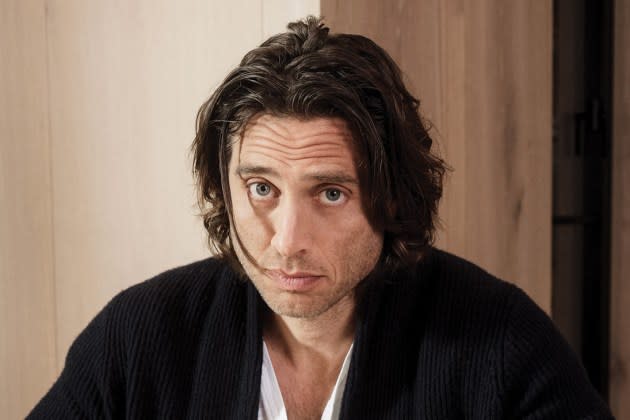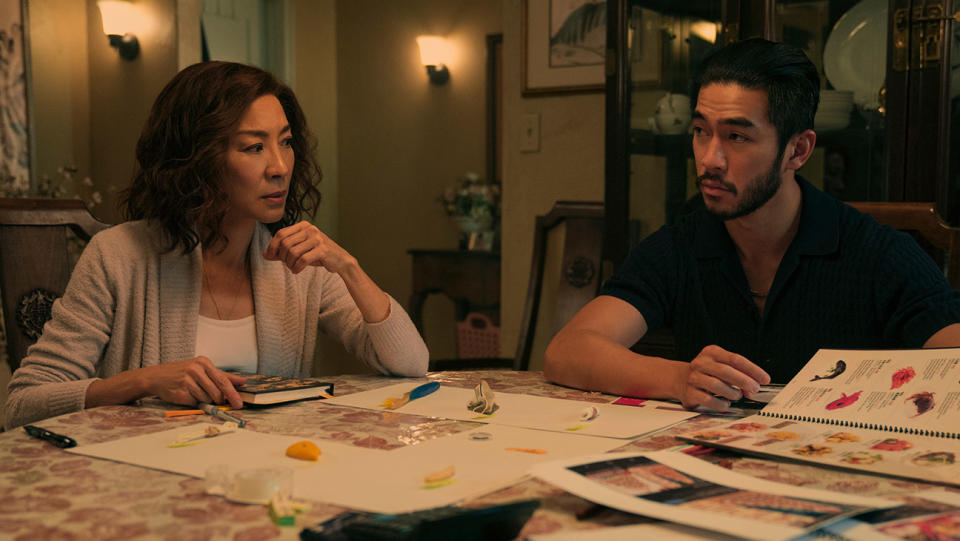Brad Falchuk Finally Goes Solo
- Oops!Something went wrong.Please try again later.
- Oops!Something went wrong.Please try again later.
- Oops!Something went wrong.Please try again later.
- Oops!Something went wrong.Please try again later.
- Oops!Something went wrong.Please try again later.

When Brad Falchuk moved into wife Gwyneth Paltrow’s house in 2019, there was plenty to consider. For starters, they each came to the relationship with two children from previous marriages. So, in reconfiguring the Goop founder’s longtime Brentwood pad for a family of six, Falchuk’s home office became a bit of an afterthought.
“If I’m on Zoom, this is my background: clothes,” says the power producer best known for his collaborations with Ryan Murphy — Glee, American Horror Story, 911, Pose — while giving a tour of the tight (but extremely well-attired) closet where he found room for a desk. He adds, “I’d love to be surrounded by books, but I’m dyslexic anyway.”
More from The Hollywood Reporter
With their daughters now sophomores in college and their sons seniors in high school, things are getting less cramped in the Falchuk-Paltrow household. In fact, the writer and director often finds himself drifting to other spaces to work, like their chic back house or, during our mid-December interview, the sprawling formal living room decked out for Christmas. But the 52-year-old Massachusetts-bred producer is looking beyond the holidays. His Brad Falchuk Teley-Vision shingle launches The Brothers Sun, an action dramedy starring Michelle Yeoh, on Netflix Jan. 4 — marking his first showrunning gig after 15 years of almost exclusively sharing the job with Murphy.
***
It’s been more than a decade of collaborations for you. How does it feel to be the main guy?
When you work in a partnership for so long, there are so many ways in which you compromise. But there’s no real sense of … How would I do it if it was 100 percent me? Working on this show helped me define what it’s like to work if it’s just me. But I’m nervous. I’m obviously more exposed here. The good thing about not wanting attention all the time is you also don’t get the criticism. You don’t get the good stuff, but you don’t get people yelling at you quite as much. I’m not worried about failure. But I really want success.
The Brothers Sun is based on an idea by a relatively green writer, your fellow showrunner Byron Wu, and the result is a distinctly Asian American story. Did you have any reservations being a white showrunner?
No, it’s like with Pose. I never worry about that because I know I can approach it with humility and confidence. We had an all-Asian writers room, so there were a lot of times where I didn’t talk. I just listen. Other times, I’m there to push and do the normal showrunner things. I’m always honored to be invited into these spaces, but I don’t worry about being able to know my place there. Byron’s young but so clearly competent. I thought, “This is a guy I can work with and mentor, and he can bring a lot to the table.” It’s not like I’m just carrying the load. It’s similar to what Ryan and I did with Ian Brennan on Glee.

Pose ended on a bittersweet note when Janet Mock, your fellow producer, reportedly decried some male involvement in the show at a screening. Do you two still talk?
It was just a tough, very emotional situation. And I don’t know, I think we’re OK. We haven’t really spoken much since then, but I haven’t spoken to a lot of people. It’s hard when a show ends.
How did you spend your strike?
I’ve been writing on a TV schedule since, I don’t know, 2003? So instead of writing 10 pages a day, I let myself write two — or work on a scene for a week, which I’ve never done before. I surfed, I worried, I spent time with people I cared about and I wrote a spec. I can’t imagine not writing anything over that many months. I would’ve lost my mind.
Are you still under an overall deal at Netflix?
It’s now a first-look. The overall was great, and it was lucrative. But it’s very hard to be at only one place because there were things they didn’t like that I was really passionate about. I found that difficult sometimes. They were super supportive and we developed a couple of things, but for the most part, they were things I knew would be better at other places. Now they get to see if they want something — and if they do, great. If not, I go other places. I was really needing the freedom.
When you started at Netflix, it was much more of a black box. What do you think of the viewership data dump it just released, ranking by shows by hours viewed?
Maybe it’ll tell people who haven’t seen some of those shows that they exist, but I don’t know how much it’s going to impact the financials for everybody making those shows. I still don’t know exactly what “an hour” means, but I’m glad that it’s not quite as much of a mystery.
What’s your big concern with the content contraction that’s hitting Hollywood?
If I hand you a bunch of scripts and the budget comes back 20 percent less than how much I know it’s going to cost to make them, that’s where I struggle. And nobody gets a blank check. It’s always a fight. But if budgets get lower, the money’s still got to go on the screen. Audiences can tell when something’s cheap.
Ryan has said he wishes he’d done a lot of things differently on Glee. Do you feel the same? What was your lesson from the highs and lows of that experience?
None of us were prepared for that level of success. I was younger, it was a little overwhelming, and a lot of us got caught up in our egos. There was a feeling of scarcity. We were writing about high school, so it’s very hard not to regress a little. It was a crucible. At the same time, we had so much fun and everyone got along so well. Things went to hell, and then everyone got along again. It was chaotic. I’d never want to go back there, and then I’ll think, “Gosh, I’d love to go back there.” But the biggest learning from that show? Taking the ego out of everything and being an adult.
IP remains a Hollywood fixation. Could Glee be remade?
I’m sure everything is always on the table, but is there a way to tell that story in a more modern way? So much of what Glee was about was really this transition from an old way of looking at representation to a new way. I’d never say no, but I wonder what the point would be — except it’d be a moneymaker.
One of your few shows to not hit big was Scream Queens. Do you think, under other circumstances, it could have had a longer run?
I truly think so. I mean, it wasn’t working. People weren’t watching it. But I’ve never had more fun. Fox might not have been the right place for it, and I think it was a little ahead of its time. It probably belonged on a streamer. We were hitting on narcissism — that’s what the show is about — and, a few years later, people would’ve recognized it a little bit more. It was hard because viewers were like, “Why are these people all so terrible?” They were all terrible! That’s what we were trying to say.
The Suits phenomenon makes one wonder what platform and placement can do for other old shows.
I don’t know how Scream Queens is doing, but it’s on Hulu. Glee is just constant. There are always 14-year-olds to start watching Glee and to get obsessed.
What’s the most challenging part of your job?
I’m super dyslexic, so I really need people to help me read stuff.
When were you diagnosed?
College, and I definitely have the scars from not knowing earlier. I had very impressive parents. My brother and sister were brilliant, and I was pushing for a C-minus. The take on me was, “He’s really not working hard enough.” I knew it didn’t matter how hard I worked, and so I just assumed that I was the dumb kid. You don’t lose that wound. During my sophomore year of college, my dad said, “I think we should get you tested for some stuff.” He’s not here to ask how he got the idea, but I got tested and they were like, “Oh, you’re very, very dyslexic.”
How does it impact your writing?
To keep up in a literature class without having read the book, I listened to the conversations to pick up on character motivations, story structure and themes. So I have a real sense of story and working in a writers room. That’s a gift. And I write very fast. But reading is hard. Granular notes are hard. And if somebody submits a book to adapt, I’m not reading it until it’s gone far enough down the line where I absolutely have to. That’s rare.
You’ve spent your career with Ryan — a big personality — and you’re now married to a global public figure. Is there a throughline there?
I think the throughline is that I don’t need external attention in that way. But even more than that, I have relationships with people who make me feel good. Ryan and I are really close. We’re brothers. Part of what’s great about our relationship is how different we are, personality-wise, and that’s sort of how we lift each other up. Gwyneth is a huge, obviously public figure, but it’s not who she is or what she’s chasing, right? Our relationship, being husband and wife, that exists on a desert island somewhere. So, the [two dynamics] look similar, but it’s totally different.
Is it ever hard to negotiate your aversion to attention with the Goop brand of candor?
No, not at all. We have nothing but trust in one another. I love how she is in the world and how much she’s moving culture forward. I find it all delightful. And we’re pretty private. We’re homebodies.
You have the nicest kitchen I’ve ever seen. Do you cook?
I cooked for Gwyneth at the beginning of our relationship. But when she watches me in the kitchen, I can feel her eyes on me — the way I’m chopping or the way I’m frying. (Laughs.) I’m just too uncomfortable. So, not anymore. And why would I cook when she’s so good at it? I’d be nuts. Should I throw the football or should Tom Brady?
This story appears in the Jan. 4 issue of The Hollywood Reporter magazine. Click here to subscribe.
Best of The Hollywood Reporter

